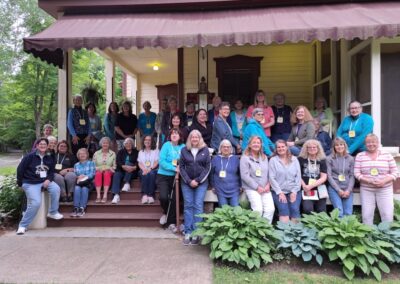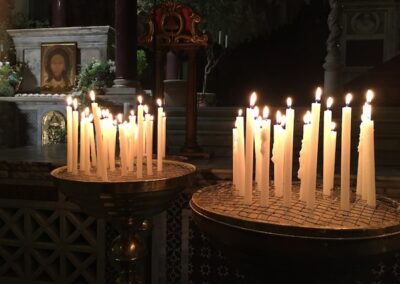 Ever since I first came in contact with the writings of Thomas Merton some 25 years ago, he has spoken to me. I know I’m not alone there. Countless people of every faith and persuasion have found meaning in his writings and his life. Of course, others will counter that with claims that he was too flawed to be held up as a role model, or, dare I say, saint. But that’s precisely why he’s a great example.
Ever since I first came in contact with the writings of Thomas Merton some 25 years ago, he has spoken to me. I know I’m not alone there. Countless people of every faith and persuasion have found meaning in his writings and his life. Of course, others will counter that with claims that he was too flawed to be held up as a role model, or, dare I say, saint. But that’s precisely why he’s a great example.
I find comfort in the fact that he carried on, following his path toward God, even when he was thrown off course by his humanness. I look at Merton and see holiness wrapped in weakness, and isn’t that where most of us are? We’re all called to be saints, but oftentimes our humanity gets in the way. In Merton, we can see ourselves, trudging ever closer to God despite mistakes — some of them pretty major — and confusion and doubt.
Today, on the 42nd anniversary of his death by accidental electrocution in Bagkok, I am taking time to remember and reflect, but Merton is never far from my thoughts because so many of his words are constantly ringing in my ears.
Hanging next to my desk is this Merton quote from Thoughts in Solitude:
My Lord God, I have no idea where I am going.
I do not see the road ahead of me. I cannot know for certain where it will end. Nor do I really know myself, and the fact that I think I am following Your will does not mean that I am actually doing so. But I believe that the desire to please You does in fact please You. And I hope I have that desire in all that I am doing. I hope that I will never do anything apart from that desire. And I know that, if I do this, You will lead me by the right road, though I may know nothing about it. Therefore I will trust You always though I may seem to be lost in the shadow of death. I will not fear, for You are ever with me, and You will never leave me to face my perils alone.
See what I mean? Comforting and yet challenging. I read those words and think, “Oh, good, Merton had no idea where he was going either.” Then I read a little more and think, “Oh, no, he trusted God completely. Can I do the same?” For me that’s a saintly role model, reminding me that I’m not alone but pushing me to go beyond my typical response and reach for something deeper, truer.
A couple of years ago, I received a wonderful blessing in the form of a silent retreat called “Merton in the Mountains.” By a lake in the low peaks of the Adirondacks I had one weekend of solitude and silence, a brief glimpse into Merton’s way of life. It wasn’t easy. In fact, it was downright difficult and more than a little frightening — to give up my voice, to sit and wait for God while trying to throw off the monkeys of worry and doubt and pride and ambition. Merton knew those same feelings, and yet he continued to return to the silence, the solitude because that is where he knew he’d find God.
Another quote from Thoughts in Solitude:
To love solitude and to seek it does not mean constantly traveling from one geographic possibility to another. A man becomes a solitary at the moment when, no matter what may be his external surroundings, he is suddenly aware of his own inalienable solitude and sees that he will never be anything but solitary. From that moment on, solitude is not potential — it is actual.
But perhaps the quote that always calls me back, the one that echoes in my head, is the quote below. It’s a constant reminder of my inability to ever know God if I try to make him in my own image:
God approaches our minds by receding from them. We can never fully know Him if we think of Him as an object of capture, to be fenced in by the enclosure of our own ideas.
We know him better after our minds have let him go.
The Lord travels in all directions at once.
The Lord arrives from all directions at once.
Wherever we are, we find that He has just departed. Wherever we go, we discover that He has just arrived before us.
Merton reminds me that I still have a shot, even when I don’t get it right on a pretty regular basis. Merton, with his beautiful and powerful words, gives me something to hold onto when God feels very far away.
Thomas Merton, pray for us.







